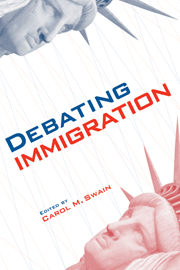Book contents
- Frontmatter
- Contents
- About the Contributors
- Preface
- Acknowledgments
- 1 Introduction
- PART I PHILOSOPHY AND RELIGION
- 2 The Disconnect between Public Attitudes and Policy Outcomes in Immigration
- 3 Carved from the Inside Out
- 4 A Biblical Perspective on Immigration Policy
- 5 The Moral Dilemma of U.S. Immigration Policy
- PART II LAW AND POLICY
- PART III ECONOMICS AND DEMOGRAPHICS
- PART IV RACE
- PART V COSMOPOLITANISM
- PART VI CONCLUSION
- Notes
- Index
2 - The Disconnect between Public Attitudes and Policy Outcomes in Immigration
Published online by Cambridge University Press: 05 June 2012
- Frontmatter
- Contents
- About the Contributors
- Preface
- Acknowledgments
- 1 Introduction
- PART I PHILOSOPHY AND RELIGION
- 2 The Disconnect between Public Attitudes and Policy Outcomes in Immigration
- 3 Carved from the Inside Out
- 4 A Biblical Perspective on Immigration Policy
- 5 The Moral Dilemma of U.S. Immigration Policy
- PART II LAW AND POLICY
- PART III ECONOMICS AND DEMOGRAPHICS
- PART IV RACE
- PART V COSMOPOLITANISM
- PART VI CONCLUSION
- Notes
- Index
Summary
Immigration law and policy exhibit a deep structure that shapes them at every turn and that catches my attention every time I teach about immigration or discuss it with my friends and with other scholars in the field. The structure is this: the political economy of immigration is far more one-sided and expansionist than the public attitudes toward immigration, and this is even more true of immigration law scholarship. That is, almost all of the significant political interest groups in the United States with an interest in immigration policy, and almost all immigration law scholars, advocate very strongly in the direction of maintaining an expansive immigration policy – and the policy outcomes testify to their success. Finally, and perhaps needless to say, the principal lawyers' organizations in this field – the American Bar Association and the American Immigration Lawyers Association – also favor expansion.
In contrast, the general public evidently favors – and has always favored, as far as one can tell from opinion surveys – either more restrictive immigration policies or at least no further expansion of immigration. As a shorthand, I call this discrepancy between restrictive or status quo public attitudes and expansive policy outcomes a “political disconnect.” In this chapter, I shall describe this disconnect and the immigration-specific political economy that I believe largely explains it, concluding with some brief reflections on the phenomenon.
- Type
- Chapter
- Information
- Debating Immigration , pp. 17 - 31Publisher: Cambridge University PressPrint publication year: 2007
- 7
- Cited by



